Flag of Myanmar
 | |
| Use | National flag, civil and state ensign |
|---|---|
| Proportion | 2:3[1] |
| Adopted | 21 October 2010 |
| Design | A horizontal triband of yellow, green and red; charged with a large white five-pointed star at the centre. |
|
Variant flag of | |
| Use | Naval ensign |
| Proportion | 5:9 |
| Design | White field with a red canton charged with a white five-pointed star. A blue anchor in the lower fly.[2] |
The current flag of Myanmar (also known as Burma) was adopted on 21 October 2010 to replace the former flag in use since 1974. The new flag was introduced along with implementing changes to the country's name, which were laid out in the 2008 Constitution.
The design of the flag has three horizontal stripes of yellow, green and red with a five-pointed white star in the middle. The three colours of the stripes are meant to symbolise solidarity, peace and tranquility, and courage and decisiveness.[3]
Colours
| Scheme | Yellow | Green | Red | White |
|---|---|---|---|---|
| Pantone | 116 | 361 | 1788 | Safe |
| RGB | 254-203-0 | 52-178-51 | 234-40-57 | 255-255-255 |
| HTML | #FECB00 | #34B233 | #EA2839 | #FFFFFF |
| CMYK | 0, 20, 100, 0 | 71, 0, 71, 30 | 0, 83, 76, 8 | 0, 0, 0, 0 |
History
1948 flag
.svg.png)
The two flags used by the country immediately prior to the 2010 flag both originated in the Burmese Resistance, which adopted a red flag with a white star when fighting the occupying Japanese forces during World War II.
The flag adopted upon independence from the United Kingdom on 4 January 1948 consisted of a red field with a blue canton. The blue canton was charged with one large white star, representing the union, surrounded by 5 smaller stars representing the main ethnic groups found within the newly independent state.[4] This flag remained in use until January 1974 and has a ratio of 5:9.[5]
1974 flag
.svg.png)
The new flag adopted on 3 January 1974 upon the declaration of a socialist republic by Ne Win has a similar ratio as the previous flag and depicted 14 stars, encircling a gear and a rice plant in a blue-coloured canton against a red field. The rice stands for agriculture, the gear represents industry, and the 14 stars represent each of the 14 member states of the Union.[6] The 14-star flag was hung upside down during the 8888 Uprising of 1988 by the protesters as a sign of protest against the military government.
2010 flag

A new design for the national flag was proposed on 10 November 2006 during a constitutional convention. The new flag would have consisted of three equally sized green, yellow, and red horizontal stripes, with a white star in the hoist end of the green stripe.[6]
In September 2007 another new design was proposed, this time with a larger white star in the middle and with the stripes in a different order, namely: yellow, green, red.[6] That same order was used in the flag of the State of Burma during the Japanese occupation of Burma, which featured a green peacock in the centre.
The proposal was a fusion of the flag of the State of Burma without the royal peacock, taking instead the white star that symbolised the Union of Burma in the canton of its flag.
The flag proposed in September 2007 was included in the new constitution, and was accepted with the 2008 referendum.[7] Officials were told to lower the old flag in favour of the new one only shortly before 3:00 p.m. local time on 21 October 2010.[3] Orders were also handed out to ensure all old flags were burned.[7] The adoption of the new flag was announced on state media just prior to the flag changing.[3]
The new flag is a horizontal tricolour flag of yellow, green and red charged with a five-pointed white star in the middle of the field. The yellow represents solidarity; the green symbolises peace, tranquility and lush greenery; the red represents courage and determination; and the white star stands for the significance of the union of the country.[6]
Historic flags
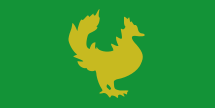 Flag used in the Hanthawaddy Kingdom (c.1300–1500)
Flag used in the Hanthawaddy Kingdom (c.1300–1500) Flag of the Third Burmese Empire under the Konbaung dynasty (1752–1885)
Flag of the Third Burmese Empire under the Konbaung dynasty (1752–1885)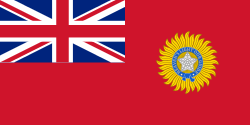 Flag of British Burma as a part of British India (1824–1937)
Flag of British Burma as a part of British India (1824–1937).svg.png) Flag of British Burma as a separate colony (1939–1941, 1945-January 3, 1948)
Flag of British Burma as a separate colony (1939–1941, 1945-January 3, 1948)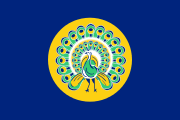 Flag of British Burma (1941–1942)
Flag of British Burma (1941–1942).svg.png) Provisional flag used during the Japanese Occupation (1942–1943)
Provisional flag used during the Japanese Occupation (1942–1943).svg.png) Flag of the State of Burma (1943–1945)
Flag of the State of Burma (1943–1945).svg.png) Simplified flag of the State of Burma (1945)
Simplified flag of the State of Burma (1945)
Similar flags to the flag of Myanmar

 The flag of Ghana
The flag of Ghana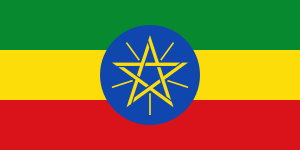 The flag of Ethiopia
The flag of Ethiopia.svg.png) The flag of Bolivia
The flag of Bolivia
Green, yellow, and red are considered the Pan-African colours, leading many commentators to note that the new flag looked distinctly "African" and even that it was being confused for the flag of an African country.[8]
Former flag
 The flag of the Republic of China (Taiwan)
The flag of the Republic of China (Taiwan)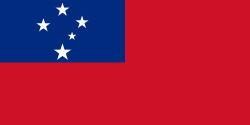 The flag of Samoa
The flag of Samoa
See also
References
- ↑ State Flag Law with State Peace and Development Council Law (8/2010)
- ↑ Burmese Flags (Myanmar) from The World Flag Database. Flags.net (21 October 2010). Retrieved on 2011-05-27.
- 1 2 3 "Myanmar unveils new flag". AP. Straits Times. 21 October 2010. Archived from the original on 24 October 2010. Retrieved 23 October 2010.
- ↑ Myanmar (Burma) : former flags. Myanmars.net (4 January 1948). Retrieved on 2011-05-27.
- ↑ Myanmar (Burma): former flags. Fotw.net. Retrieved on 27 May 2011. Archived 29 April 2011 at the Wayback Machine.
- 1 2 3 4 Tai, Yu-liang. "緬甸 Myanmar/Burma" (in Chinese). Retrieved 23 October 2010.
- 1 2 Birsel, Robert (21 October 2010). "Myanmar gets new flag, official name, anthem". Reuters. http://www.webcitation.org/5thEflNof. Retrieved 23 October 2010.
- ↑ Cropley, Ed (10 November 2012). "Myanmar's African Flag". Reuters. Archived from the original on 13 December 2013. Retrieved 8 December 2013.
External links
| Wikimedia Commons has media related to Flags of Myanmar. |
